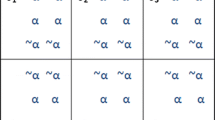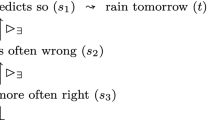Abstract
This paper treats two problem cases in decision theory, the Newcomb problem and Reed Richter's Button III. Although I argue that, contrary to Richter, the latter case does not constitute a genuine counterexample to a standard general proposition of (causal) decision theory, I agree with and undertake to amplify his solution to the decision problem in Button III. I then apply the conclusions and distinctions in the foregoing treatment of Button III to the Newcomb problem and argue that a familiar version of the dominance argument for taking both boxes runs afoul of plausible general constraints on rational agency. The underlying theme of the paper is that basic considerations of epistemic coherence play an important role in dealing with problem cases in decision theory.
Similar content being viewed by others
References
Brams, S. J.: 1983,Superior Beings, Springer-Verlag, New York.
Darwall, Stephen L.: 1983,Impartial Reason, Cornell University Press, Ithaca.
Gibbard, Allan and William L. Harper: 1978, ‘Counterfactuals and Two Kinds of Expected Utility’, in C. A. Hooker, J. Leach and E. F. McClennen, (eds.),Foundations and Applications of Decision Theory, D. Reidel, Dordrecht.
Harman, Gilbert: 1973,Thought, Princeton University Press, Princeton.
Hunter, Daniel and Reed Richter: 1978, ‘Counterfactuals and Newcomb's Paradox’,Synthese 39, 249–61.
Jeffrey, Richard C.: 1983,The Logic of Decision, 2nd ed., Chicago University Press, Chicago.
Kelley, Leigh B.: 1987, ‘Impartiality and Practical Reason’,Philosophy Research Archives XII, 1–65.
Levi, Isaac: 1977, ‘Subjunctives, Dispositions and Chances’,Synthese 34, 423–55.
Levi, Isaac: 1982, ‘A Note On Newcombmania’,Journal of Philosophy 79, 337–42.
Nozick, Robert: 1969, ‘Newcomb's Problem and Two Principles of Choice’, in Nicholas Rescher (ed.),Essays in Honor of Carl G. Hempel, D. Reidel, Boston. pp. 114–46.
Richter, Reed: 1984, ‘Rationality Revisited’,Australasian Journal of Philosophy 62, 392–403.
Richter, Reed: 1985, ‘Rationality, Group Choice and Expected Utility’,Synthese 63, 203–32.
Richter, Reed: 1986, ‘Further Comments on Decision Instability’,Australasian Journal of Philosophy 64, 345–49.
Rosenberg, Jay F.: 1974,Linguistic Representation, D. Reidel, Dordrecht.
Schlesinger, George: 1977,Religion And Scientific Method, D. Reidel, Boston.
Skyrms, Brian: 1982, ‘Causal Decision Theory’,Journal of Philosophy 69, 695–711.
Ziff, Paul: 1984,Epistemic Analysis, D. Reidel, Boston.
Author information
Authors and Affiliations
Rights and permissions
About this article
Cite this article
Kelley, L.B. Reflections on deliberative coherence. Synthese 76, 83–121 (1988). https://doi.org/10.1007/BF00869642
Issue Date:
DOI: https://doi.org/10.1007/BF00869642




